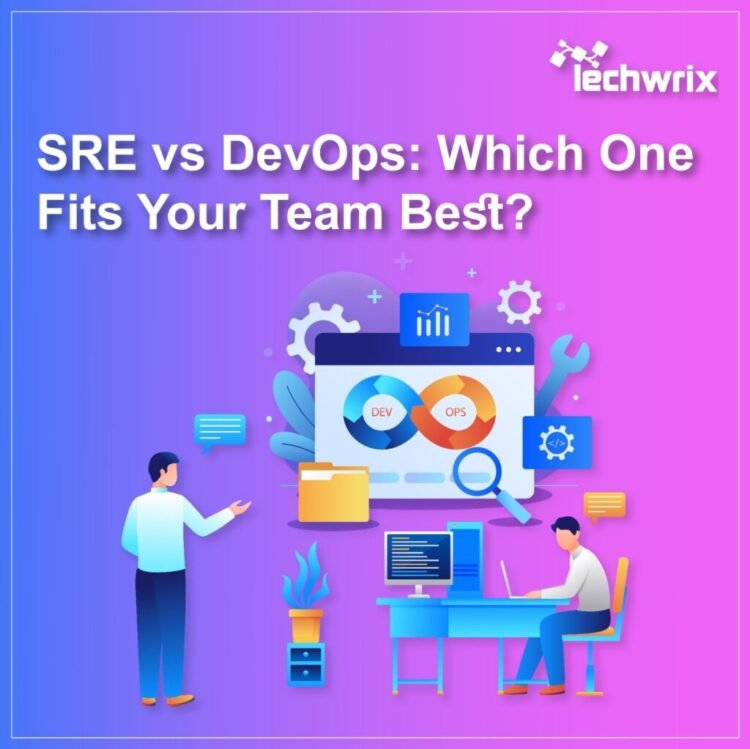In today’s high tech environment, uptime is everything, so is speed. That’s where the debate between DevOps and Site Reliability Engineering (SRE) heats up. While both aim to bridge the gap between development and operations, their methods, mindsets, and end goals are surprisingly different.
If you’re building scalable, high-performing systems in 2025, understanding the difference between SRE and DevOps isn’t optional, it’s essential. Let’s break it down.
SRE vs DevOps: What’s the Difference?
What is DevOps?
DevOps is a collaborative approach that integrates development (Dev) and operations (Ops) to shorten the software development lifecycle and ensure continuous delivery. It’s about tearing down silos and building a culture of shared responsibility, automation, and rapid feedback.
Core Goals of DevOps
- Faster time to market
- Continuous integration and deployment
- Collaboration between teams
- Automation of manual tasks
Common DevOps Tools
- CI/CD: Jenkins, GitLab CI, CircleCI
- Automation: Ansible, Terraform, Chef
- Monitoring: Prometheus, Grafana, ELK Stack
- Containers: Docker, Kubernetes
Read more: Top DevOps Tools for Seamless Salesforce CI/CD Integration
What is Site Reliability Engineering (SRE)?
SRE, born at Google, applies software engineering principles to operations. It’s not just about keeping the lights on but building scalable, reliable systems with measurable service levels.
Core Goals of SRE
- System reliability and uptime
- Error budgets to balance innovation vs stability
- Observability and performance monitoring
- Automating operational toil
Common SRE Tools
- Monitoring/Alerting: Prometheus, Alertmanager, Stackdriver
- SLO/SLA tracking: Nobl9, Service Level Indicators (SLIs)
- Incident management: PagerDuty, Opsgenie
- Chaos engineering: Gremlin, Chaos Monkey
SRE vs DevOps: A Detailed Comparison
| Aspect | DevOps | SRE |
| Definition | A cultural and technical movement focused on unifying Dev and Ops for faster, automated software delivery. | An engineering discipline that uses software principles to improve system reliability and reduce manual operations. |
| Primary Focus | Speed, automation, collaboration — get features out quickly and often. | Reliability, availability, scalability — keep systems running smoothly and recover fast. |
| Ownership Model | Shared responsibility — both Dev and Ops teams own the product lifecycle. | SRE teams own reliability, with a tight partnership with developers via error budgets and SLIs. |
| Philosophy Toward Failure | Embrace failure as learning; focus on fast detection and recovery. | Measure and control failure; minimize it proactively using automation and SLAs. |
| Use of Metrics | DevOps teams focus on metrics like deployment frequency, lead time, and mean time to recovery (MTTR). | SRE teams emphasize SLIs (Service Level Indicators), SLOs (Objectives), and SLAs (Agreements)to define and enforce reliability targets. |
| Tooling Focus | CI/CD pipelines, version control, infrastructure as code (IaC), automated testing. | Monitoring, alerting, chaos engineering, incident response, postmortems. |
| Example Scenario | Rolling out a new feature across microservices with automated testing and deployment. | Ensuring 99.99% uptime during a peak traffic event while staying within the error budget. |
| End Goal | Deliver software faster with fewer blockers and better feedback loops. | Build and maintain resilient, scalable systems that can withstand real-world failures. |
| Team Composition | Often cross-functional teams combining developers, QA, and ops. | Specialized engineers with software backgrounds focused on operations and reliability. |
Real-World Example
Imagine an e-Commerce platform preparing for a Black Friday sale.
- The DevOps team ensures rapid deployment of new features (like flash deals or payment integrations) using automated pipelines and IaC tools.
- The SRE team, on the other hand, sets an SLO for <0.1% checkout failure rate, monitors system latency, prepares incident response playbooks, and tests resilience via chaos engineering.
When Should You Choose DevOps?
- You’re scaling development teams and need faster deployments
- Your product lifecycle demands speed over perfection
- You want to build a culture of collaboration and automation
- Your current processes are fragmented or siloed
When Should You Introduce SRE?
- Your systems are growing more complex and harder to manage
- Downtime is becoming costly or brand-damaging
- You need defined reliability goals (SLOs/SLAs)
- You want to reduce firefighting and operational burden
Can SRE and DevOps Coexist?
Absolutely! in fact, they often do. Think of DevOps as the culture and SRE as the implementation model. DevOps lays the foundation for fast delivery, while SRE adds the structure and rigor to ensure reliability at scale. Together, they help teams move fast without breaking things.
Read more: Top 75 DevOps Engineer Interview Questions and Answers in 2024
SRE vs DevOps: Which One Do You Need?
If you’re just beginning your cloud-native journey or focusing on rapid iteration, DevOps is your launchpad. But if you’re managing large-scale infrastructure or handling millions of users, layering in SRE practices is the path to long-term stability.
The best teams in 2025 won’t choose one over the other — they’ll smartly combine DevOps culture with SRE discipline to build systems that ship fast and rarely break.
FAQs: SRE vs DevOps
1. Is SRE replacing DevOps?
No, SRE is not replacing DevOps. While they share goals like faster delivery and system stability, they approach them differently. SRE often builds on top of DevOps practices by introducing reliability engineering, service level objectives (SLOs), and error budgets to manage system health more proactively.
2. Can DevOps and SRE work together?
Absolutely. DevOps is about culture and collaboration, while SRE is an implementation of that culture focused on reliability. Many modern organizations use DevOps practices and embed SRE teams to ensure their systems scale reliably without sacrificing delivery speed.
3. What is the main difference between SRE and DevOps?
The main difference lies in focus and implementation:
- DevOps emphasizes automation, CI/CD pipelines, and team collaboration.
- SRE focuses on system reliability using measurable indicators like SLIs and SLOs.
DevOps is more cultural, while SRE is more engineering-principled and metrics-driven.
4. When should a company implement SRE instead of DevOps?
If your system is experiencing frequent outages, downtime is expensive, or you have strict availability targets, introducing SRE is ideal. For startups or fast-moving teams focused on rapid delivery, starting with DevOps makes more sense — you can integrate SRE as you scale.
5. Are SREs the same as DevOps engineers?
Not quite. While both roles support system operations, SREs are software engineers who build tools to improve reliability, automate ops work, and monitor system health. DevOps engineers typically focus more on pipelines, configuration, and deployment processes.


















